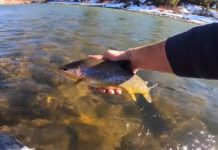New Zealand’s recreational trout fishery conservatively
earns at least one billion dollars annually for the national
economy and is now again threatened by a trout farming
proposal, says the New Zealand Federation of Freshwater
Anglers (NZFFA).
Rex Gibson, ecologist and secretary
of the trout advocacy group, says that, in terms of
international fly fishing visitors and New Zealanders
fishing regionally throughout the country, the sport is a
huge economic generator.
“Recreational freshwater
sports fishing – directly and indirectly supports thousands
of jobs – many in rural regions where unemployment is
high,” he says.
Gibson says NZFFA has made a comment
on the fishery’s value in response to a parliamentary
select committee that has recommended trout farming be
permitted following a petition from a former “ocean
ranch” salmon farmer whose Golden Bay venture failed
decades ago.
No recent firm study to reassess the
value has been undertaken, but Gibson says past estimates by
the Department of Conservation and Cawthron Institute,
extrapolated and updated to today, point to a figure worth
well over $1 billion a year.
Trout Farming a very
poor second
“The sports fishery’s dollar and
amenity value leaves a high risk, economically marginal
trout farm industry well in the rear,” he
says.
Twenty-two years ago, the issue of DoC’s
Target Taupo in November 1998, stated the “New
Zealand economy reaped around $750 million annually from
activity associated with the freshwater
fisheries”.
Taking into account increased
earnings/inflation/business expansion etc over the past two
decades that ‘around $750 million annually’ figure will
have easily doubled by now to $1.5 billion.
“So our
stating recreational trout fishing is ‘conservatively
estimated to be worth of $1 billion annually to the NZ
economy’ is totally justifiable and, if anything, an
under-estimate,” says Gibson.
Similarly supporting
the “billion dollar” figure was the Cawthron
Institute’s assessment that the value of trout angling in
1991 – over 30 years ago – was up to a quarter of a
billion dollars.
Affluent
Anglers
Gibson says there had been big increases in
inflation and also enormous “trout industry” growth over
the past three decades.
International tourists are
invariably “extra high value yielding” tourists as they
are mostly affluent and often stay at luxury lodges, using
helicopters and guides to access wilderness “trophy
trout” rivers.
Recreational freshwater fisheries
support jobs directly and indirectly in:
- Fishing
lodges, motels, hotels, motor camps. - Fishing
guides. - Fisheries officers in DoC and Fish &
Game. - Rental vehicles and rented RVs.
- Sports
shops and other retailers selling fishing
equipment. - New Zealand manufacturing industries
producing fishing equipment eg: Kilwell, Composite
Developments, K-labs etc and numerous fly
tyers. - Airlines and other transport related
industries eg: helicopter companies, the Cook Strait
ferries, taxis, Uber etc. - Cafes and restaurants in
popular trout fishing regions like Lake Taupo and
Queenstown. - Groceries, supermarkets and other food
suppliers to visiting overseas and domestic
anglers.
There are also substantial beneficial
intangible spin-offs from the sports fishery says
Gibson.
Trout fishing provides economic, cultural and
health benefits, while trout themselves, which require
clean, well-oxygenated water, also help protect the
environment through Fish and Game’s advocacy work and by
acting as ‘the canaries in the coal mines’ in terms of
warning of declining river water quality,” says
Gibson.
Trout Farm Dangers
Having witnessed
trout-farm sourced ecological disasters in the USA and
Europe, many trout fishing bodies, including Fish and Game
NZ, have grave fears that commercial trout farming is likely
to cause immeasurable, irreparable harm to the public’s
trout fishery because of :
- The risk of disease
outbreak risk from crowded pens as has happened with
Marlborough Sounds salmon farming and, as witnessed
overseas, where entire trout populations of river systems
had been wiped out for decades. - Motiving increased
poaching, netting and spearing of vulnerable trout and their
sale in black markets as has happened with paua, crayfish
and deer. - Genetic damage to NZ’s unique wild trout
strains from trout farm escapees. - High organic
polluted effluent from trout farms. - The need for
large quantities of public’s fresh water to maintain trout
farms.
Trout farm returns
poor
“And at the end of the day, trout farming
lacks economic justification with the product of farmed
trout being mediocre in comparison to wild trout; and trout
farms requiring intensive venture capital, high risks and
offering marginally economic returns. Such projects will
inevitably require high taxpayer funded ministerial input to
deal with disease, monitoring and environmental
problems.”
Gibson says a trout caught – and often
released – by an overseas tourist or domestic sports
fisher, is effectively worth hundreds of dollars a kilogram
to the economy, with all the ancillary tourism and
sports-related costs factored in, but farmed trout may not
even sell as much as farmed salmon current at $34 per
kilogram.”
Gibson, an ecologist, said in the
NZFFA’s executive ranks were high qualified people in
areas such ecology, aquaculture, resource planning and
micro-biology to name a
few.
© Scoop Media
Credit: Source link































